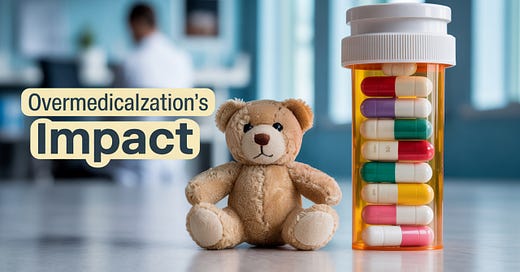Article text written with Generative AI by Grok (xAI). Video made with invideo AI.
Affiliate links
invideo AI: Make your own videos with AI
vidIQ: Boost your YouTube videos
Paperpal: AI academic writing tool. Get 20% off all plans with code PAP20
Transcript:
The “Make Our Children Healthy Again Assessment,” aka The MAHA Report, released on May 22 by the Presidential Commission to Make America Healthy Again (MAHA), delivers a sobering analysis of the childhood chronic disease crisis in the United States. With over 40% of American children suffering from at least one chronic condition, such as obesity, diabetes, or mental health disorders, the report identifies four primary drivers: poor diet, environmental chemical exposure, lack of physical activity coupled with chronic psychosocial stress, and the overmedicalization of children (p. 9). This blog post delves into Section 4, "The Overmedicalization of Our Kids," and the pervasive influence of corporate capture, while also summarizing the report’s actionable "Next Steps" to combat this crisis.
Section 4 paints a stark picture of overmedicalization, highlighting how American children are increasingly subjected to excessive medical interventions, often driven by profit rather than necessity. The report notes a staggering 600% increase in type 2 diabetes among youth since the 1980s, with over 350,000 children now diagnosed (p. 11). This trend coincides with a significant expansion of the childhood vaccine schedule, raising concerns about potential links to chronic diseases—concerns that remain understudied due to systemic barriers (pp. 63-65). The report also critiques the overprescription of medications, such as antipsychotics and stimulants, noting a 40-fold increase in ADHD and bipolar disorder diagnoses between 1994 and 2003, often driven by loosened diagnostic criteria influenced by industry ties (p. 70). These practices are exacerbated by "corporate capture," where pharmaceutical companies dominate medical systems, from research to clinical practice. For instance, since 1999, 97% of the most frequently cited clinical trials have been industry-funded, often skewing results to favor corporate products while downplaying risks (p. 67). This influence extends to regulatory bodies like the FDA, with 70% of FDA medical examiners eventually working for the pharmaceutical industry, creating significant conflicts of interest (p. 69). The report also exposes how media, fueled by $5 billion in drug advertising in 2023, amplifies these issues by promoting vague symptom lists for conditions like ADHD, leading to inappropriate parental requests for medications (p. 71).
The final section, "Next Steps - Supporting Gold-Standard Scientific Research and Developing a Comprehensive Strategy," offers a roadmap to address these systemic failures. The MAHA Commission proposes ten research initiatives, including an NIH-led effort to tackle the replication crisis in medical research, ensuring greater reliability in scientific findings. It also calls for AI-powered surveillance to analyze federal health and nutrition datasets, enabling early detection of harmful trends in childhood chronic diseases (p. 72). Additionally, the report advocates for long-term nutrition trials comparing whole-food, reduced carb, and low-ultra-processed-food diets to assess their impact on obesity and insulin resistance. To reform regulatory oversight, it suggests independent studies on self-affirmed GRAS (Generally Recognized as Safe) food ingredients, prioritizing children’s health. The Commission is already working on a "Make Our Children Healthy Again Strategy," due in August 2025, and invites collaboration from academia and the private sector to prioritize evidence-based solutions over corporate profits.
This report is a clarion call for transparency and action, urging a shift toward prevention and systemic reform to safeguard the health of future generations.
In a post on social media platform X, Laura Delano called the report “revolutionary.” Delano is Founder of the Inner Compass Initiative and author of a recent memoir about her journey through and away from harmful psychiatric treatment. She proclaimed that “history was made today,” further stating, “So many doors of possibility are now opened for us to help struggling American children reclaim themselves from medicalization and pharmaceuticalization. LET'S GO.”
References
The Presidential Commission to Make America Healthy Again (MAHA). (2025). Make Our Children Healthy Again Assessment. https://www.whitehouse.gov/maha/










Share this post